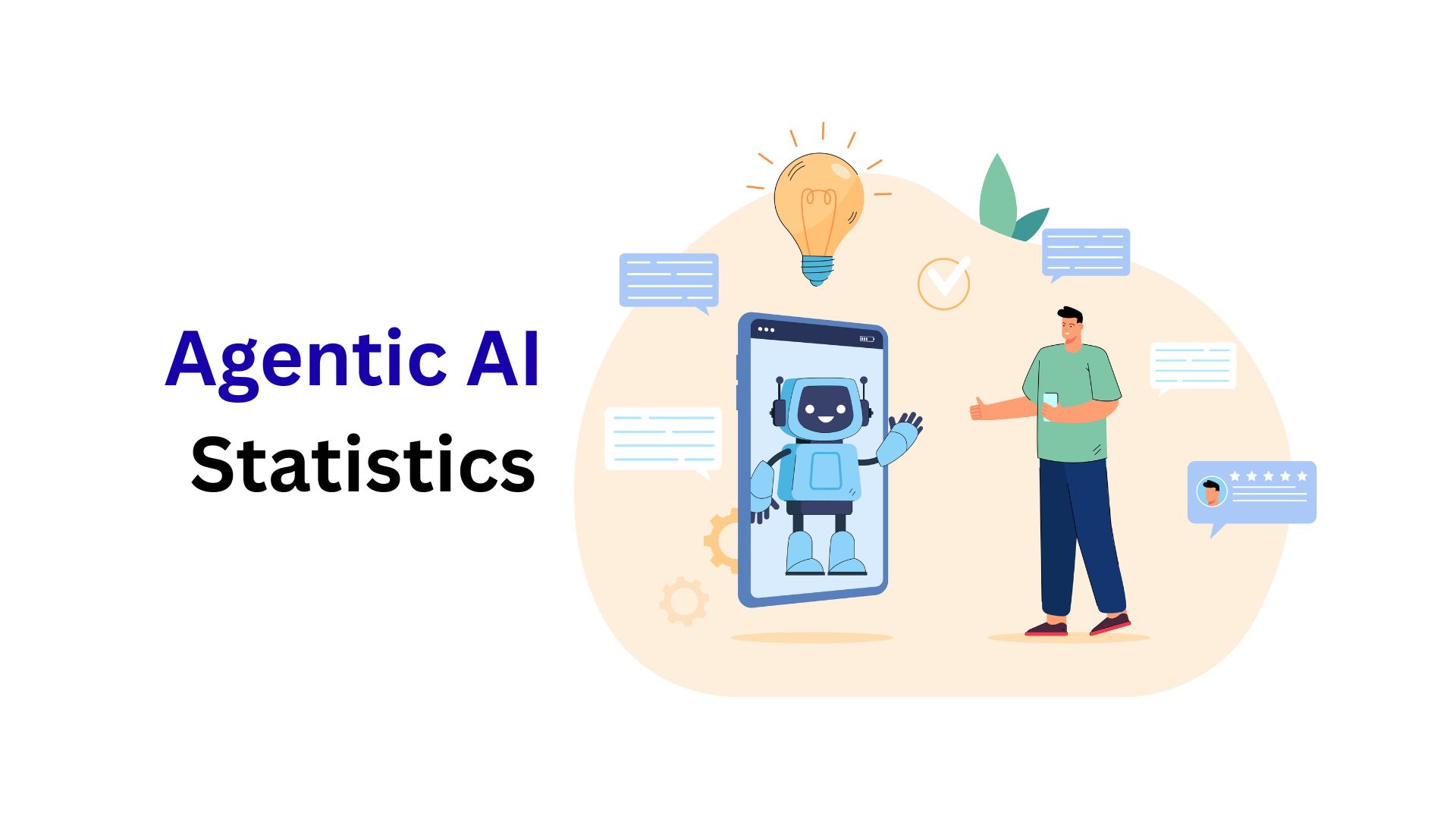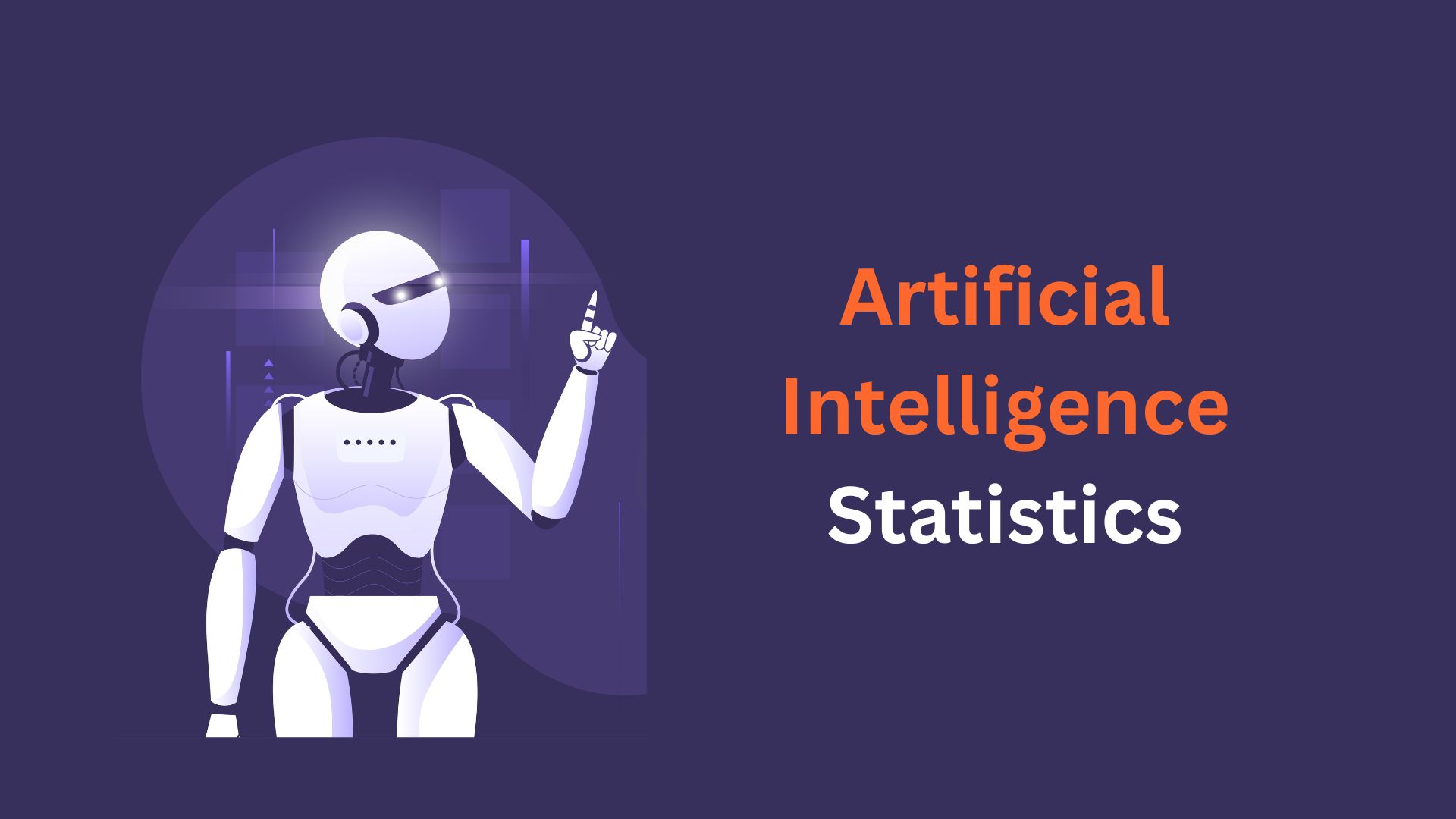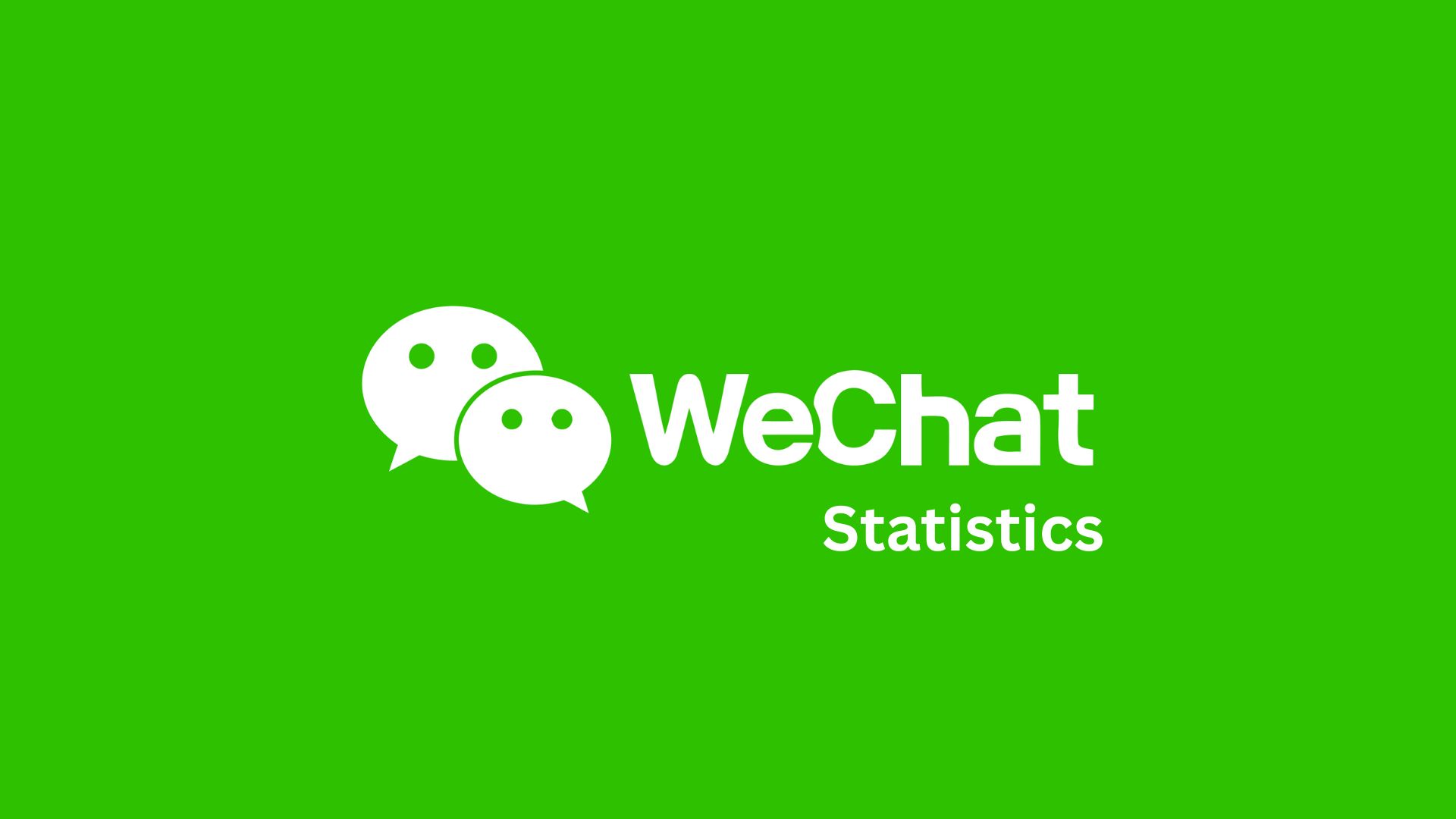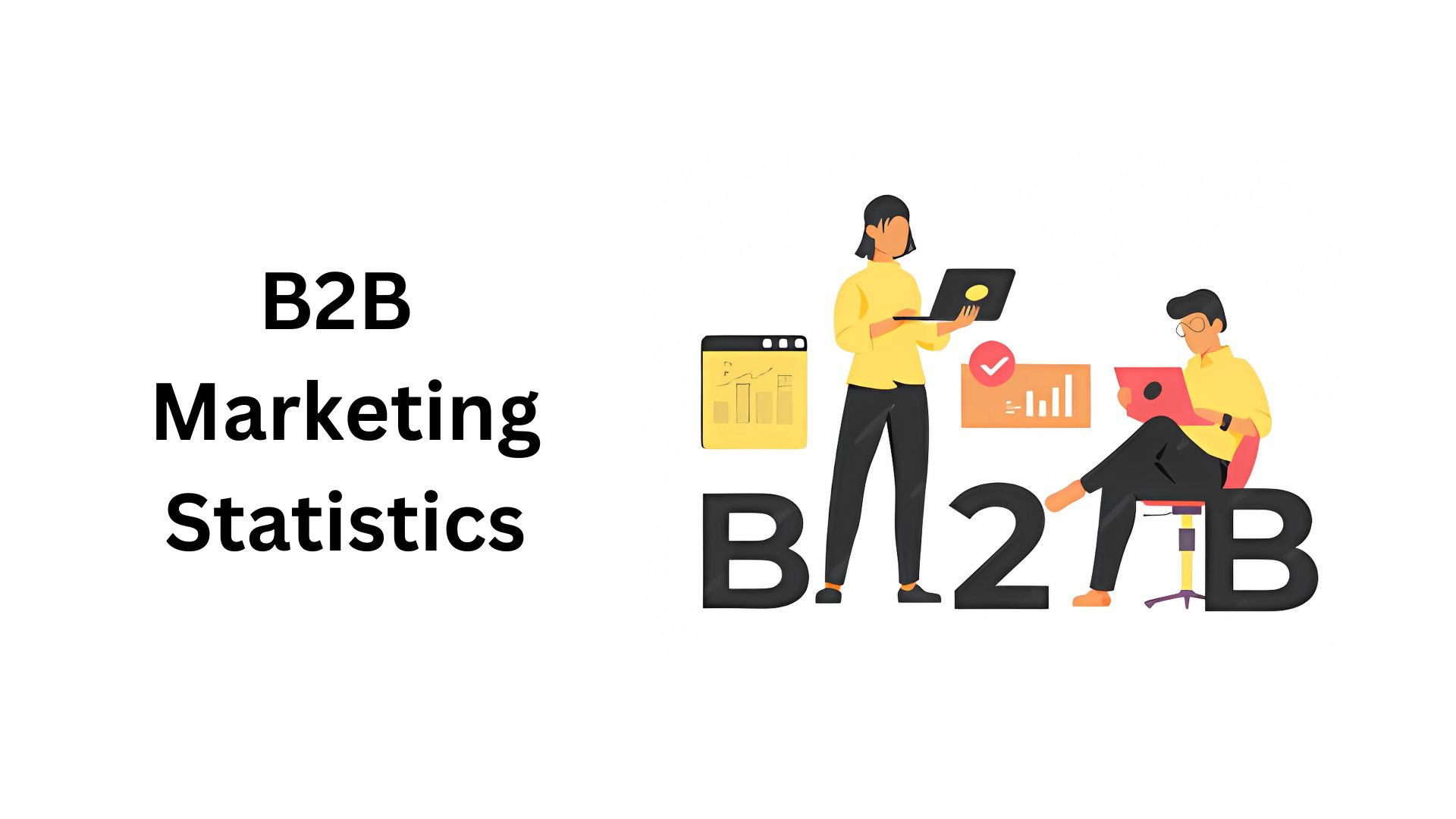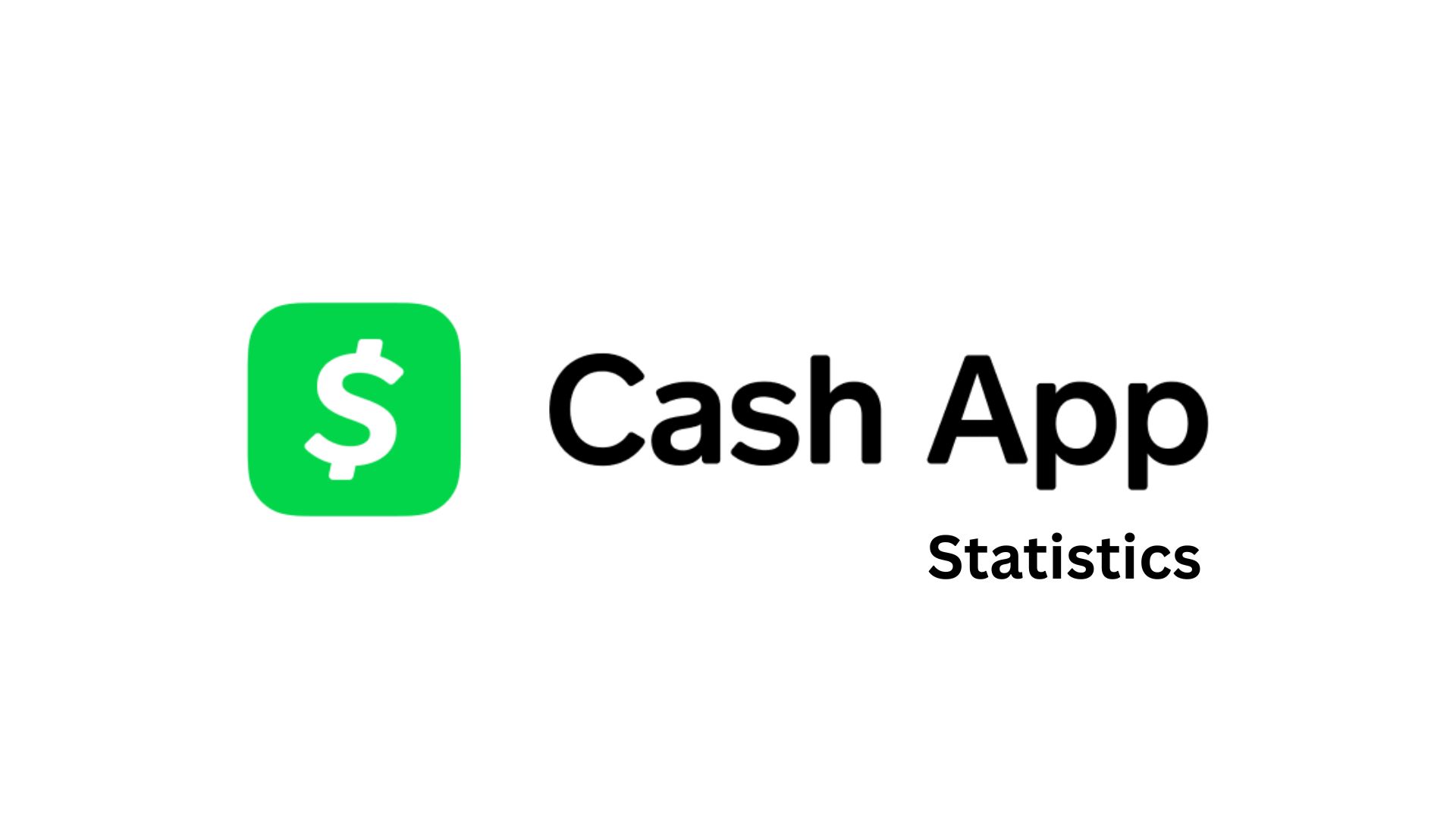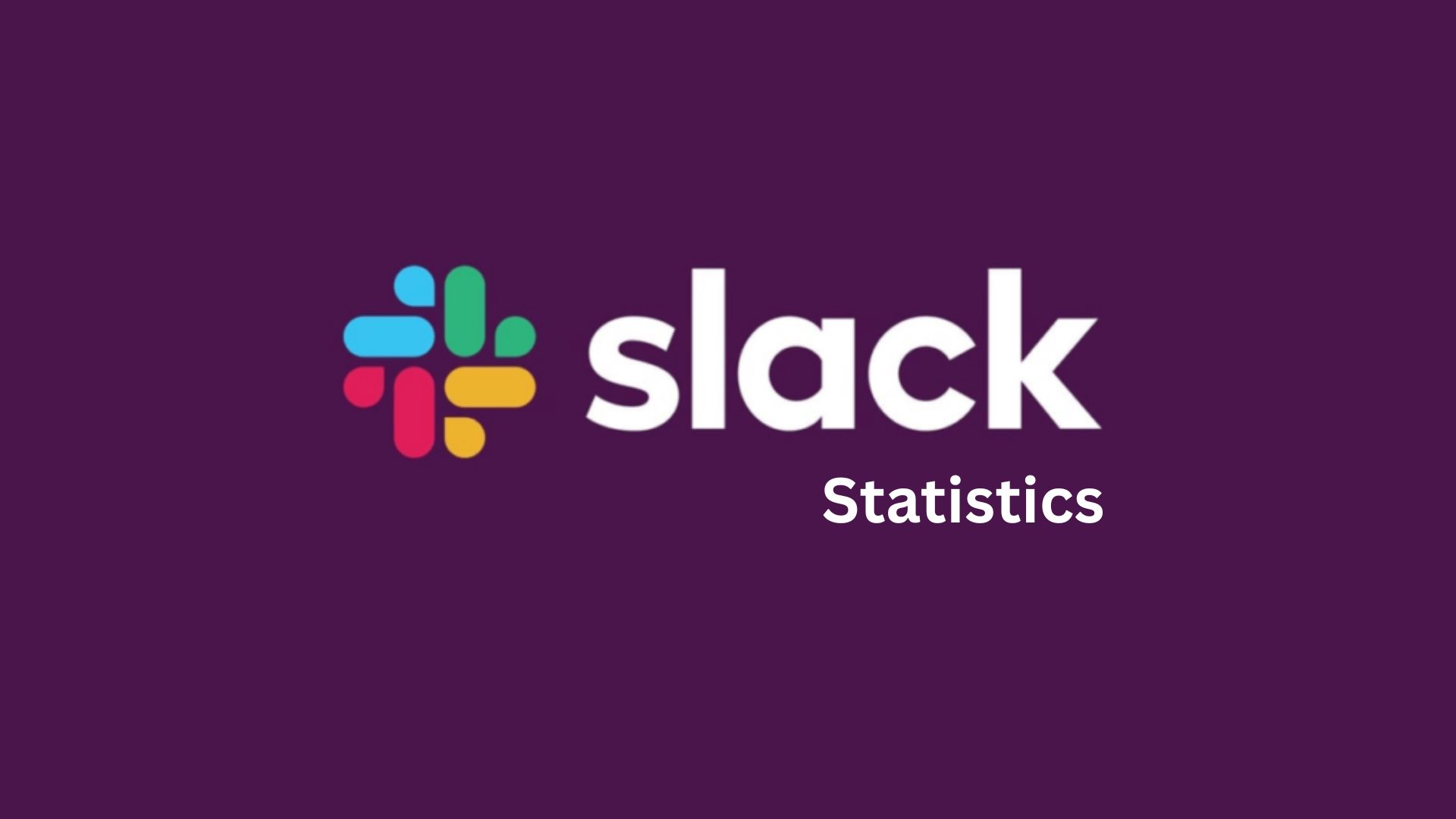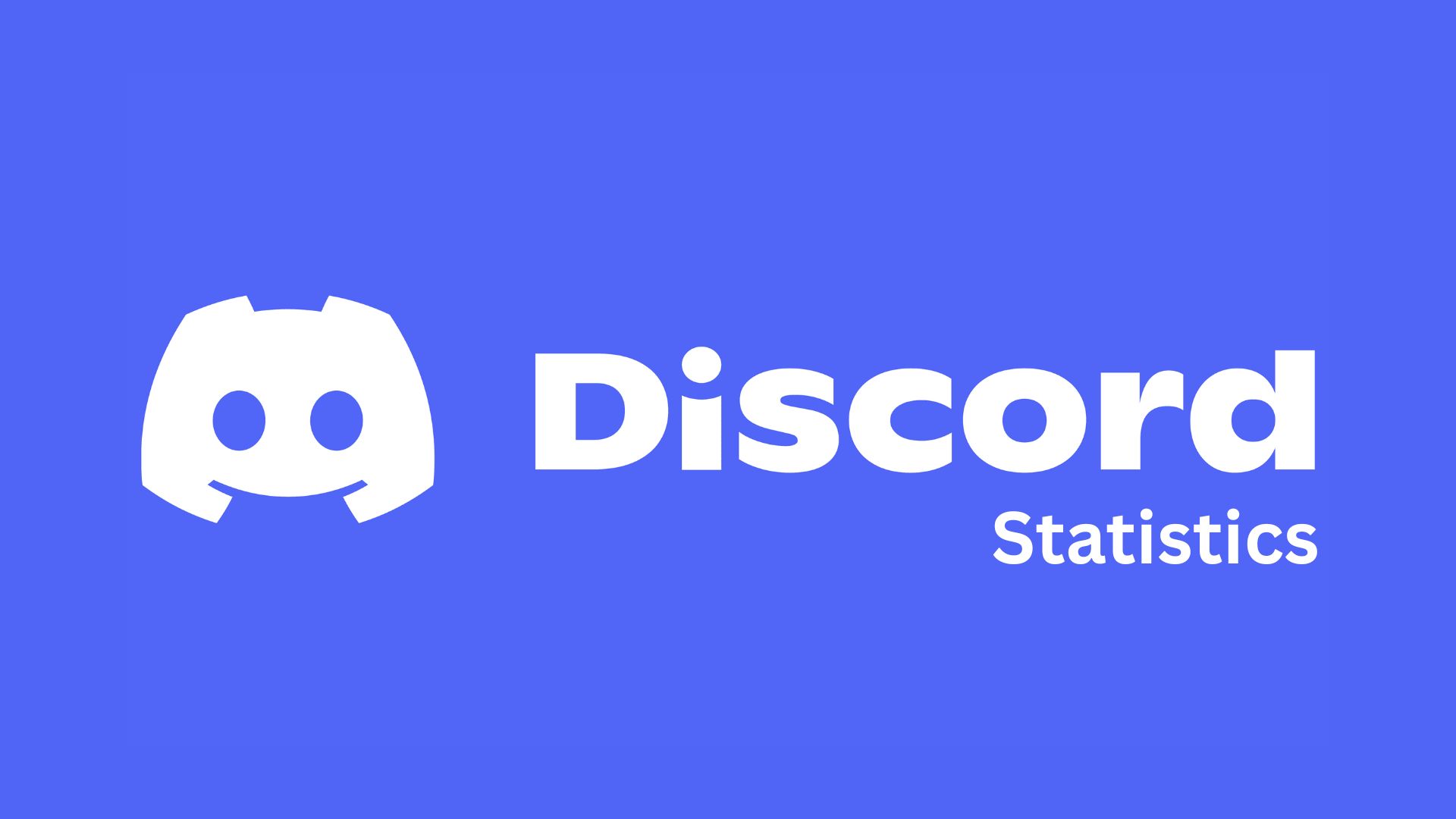AI In Healthcare Statistics By Key Areas, Market Share, User Demographics And Technology

Updated · Nov 13, 2025

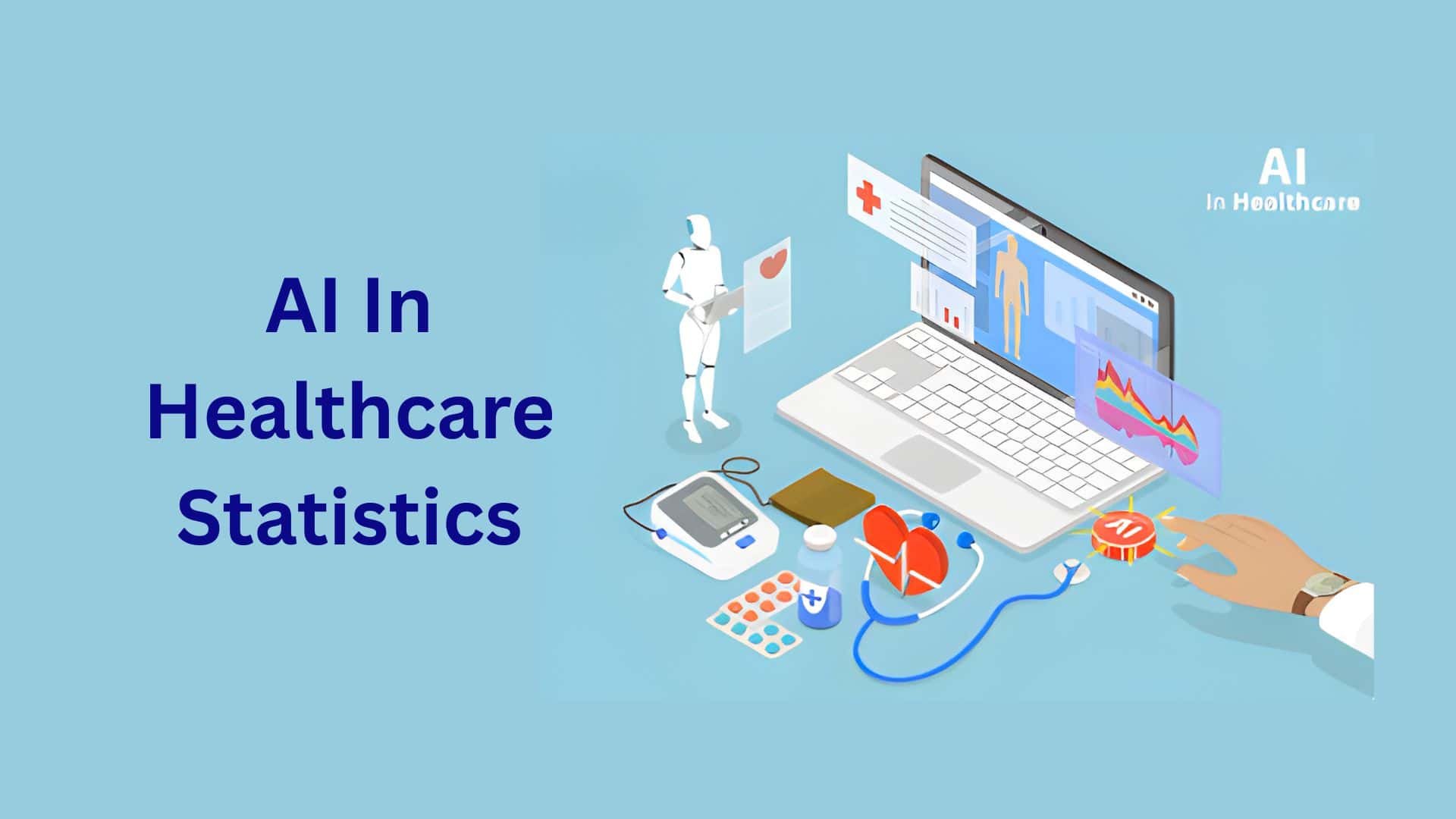
WHAT WE HAVE ON THIS PAGE
- Introduction
- Editor’s Choice
- General AI In Healthcare Statistics
- AI In Healthcare Statistics By Key Areas
- AI In Healthcare Market Share Statistics
- AI In Healthcare Market Segmentation Statistics By Technology
- AI In Healthcare Statistics By User Demographics
- US Artificial Intelligence (AI) In Healthcare Market
- Top Companies In AI In The Healthcare Market, 2024
- AI-Enabled Devices Across Medical Disciplines
- Professionals’ Views On Using AI In Healthcare Adoption
- Artificial Intelligence In The Drug Discovery Market
- Global AI In Healthcare Market Value Statistics, By Application
- Healthcare Chatbots Market Statistics By Component
- Cost-Efficiency In Healthcare Statistics By AI In Healthcare For 2024
- New AI Product Launches In Healthcare Statistics 2024
- AI Market And Technology Adoption Statistics In Healthcare For 2024
- Challenges And Barriers To Implementing AI Healthcare Features
- Conclusion
Introduction
AI in Healthcare Statistics: Artificial Intelligence (AI) in healthcare is growing rapidly, helping doctors and healthcare providers improve patient care. AI uses machines and algorithms to analyse data, such as medical records or images, to help diagnose diseases and suggest treatments faster and more accurately. AI technologies like machine learning, natural language processing, and robotic surgery are driving this growth.
AI helps in areas like medical imaging, drug discovery, and personalised treatment, making healthcare more efficient. This technology is transforming healthcare by reducing costs, speeding up diagnoses, and improving the accuracy of treatments, all while supporting healthcare professionals in delivering better care.
Editor’s Choice
- The global market valuation of AI in the healthcare market (both in clinical and system applications) is estimated to reach around USD 1.4 billion by the end of 2024, increasing from USD 1.1 billion in 2023.
- AI in healthcare saved about 20% of doctors’ time by reducing their paperwork and administrative tasks.
- AI in Healthcare Statistics shows that about 10% of doctors use AI tools like Med-PaLM2 or ChatGPT to find effective solutions.
- North America leads the AI healthcare market, holding 59.1% of the total market share.
- Meanwhile, 79% of healthcare workers stated that robotics and AI will greatly improve the healthcare industry.
- By 2025, almost 90% of hospitals will use AI technology for early diagnosis and remote patient monitoring.
- AI chatbots will help healthcare organizations save USD 3.6 billion worldwide.
- In the United States of America, around 23% of healthcare leaders think AI and machine learning greatly improve clinical outcomes.
- AI in healthcare Statistics further state that the US captured around 58% of the revenue share in the global AI in healthcare market.
- Moreover, the European Union secures the second-largest AI healthcare market, which will account for USD 50.24 billion by 2028.
General AI In Healthcare Statistics
- Artificial Intelligence can reduce the cost of discovering new drugs by up to 70%.
- By 2030, around 90% of nursing tasks will still be done by humans, despite AI advancements.
- Six out of ten Americans feel uneasy about their healthcare provider using AI.
- By the end of 2023, every stroke center in the UK will have AI technology for diagnosing strokes.
- In 2022, most of AI’s healthcare earnings came from the US, which held 58% of the market. Asia-Pacific followed with a 40.9% share.
- Similarly, AI could save USD 16 billion by helping reduce mistakes in medication dosages.
- AI in Healthcare Statistics further states that AI and machine learning are expected to lower healthcare costs by USD 13 billion by 2025.
- In contrast, AI in medical imaging will grow by 26.5% annually from 2021 to 2028.
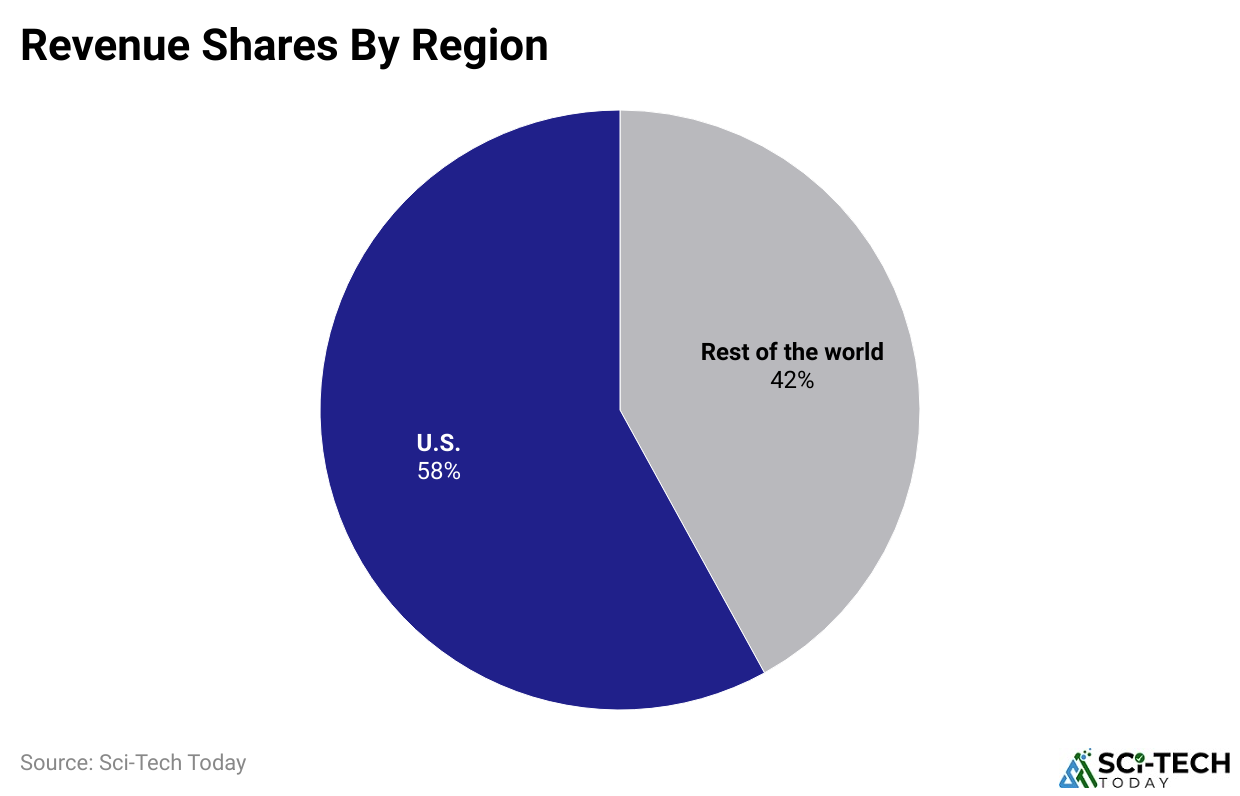 (Reference: allaboutai.com)
(Reference: allaboutai.com)
- In the second quarter of 2024, the US held a dominant position with a 58% revenue share, reflecting its strong focus on AI development and deployment.
- Similarly, the rest of the world followed with a 42.0% share.
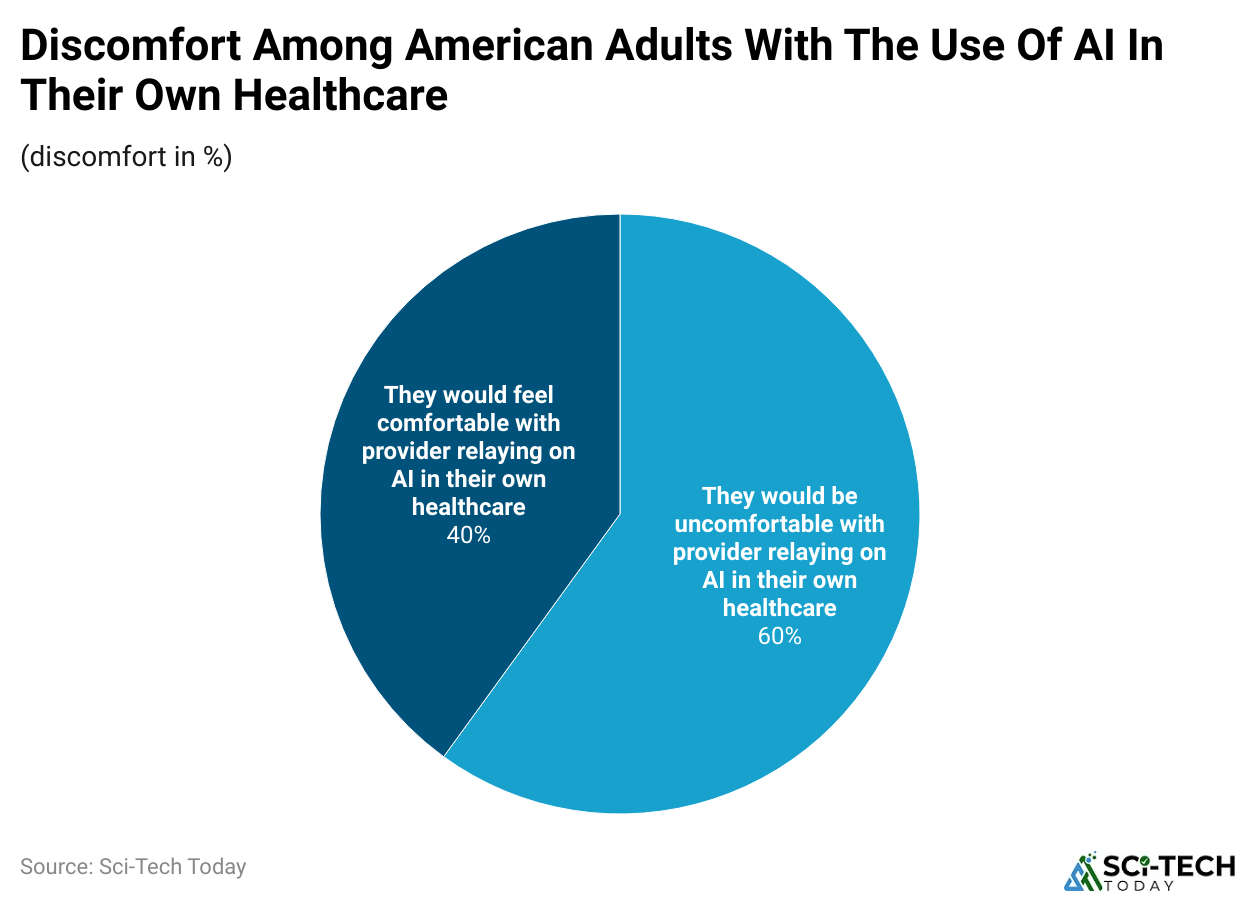
(Reference: scoop.market.us)
- In 2023, 40% of Americans believe artificial Intelligence (AI) in healthcare can reduce errors, but 60% feel uncomfortable with doctors using AI in their treatment.
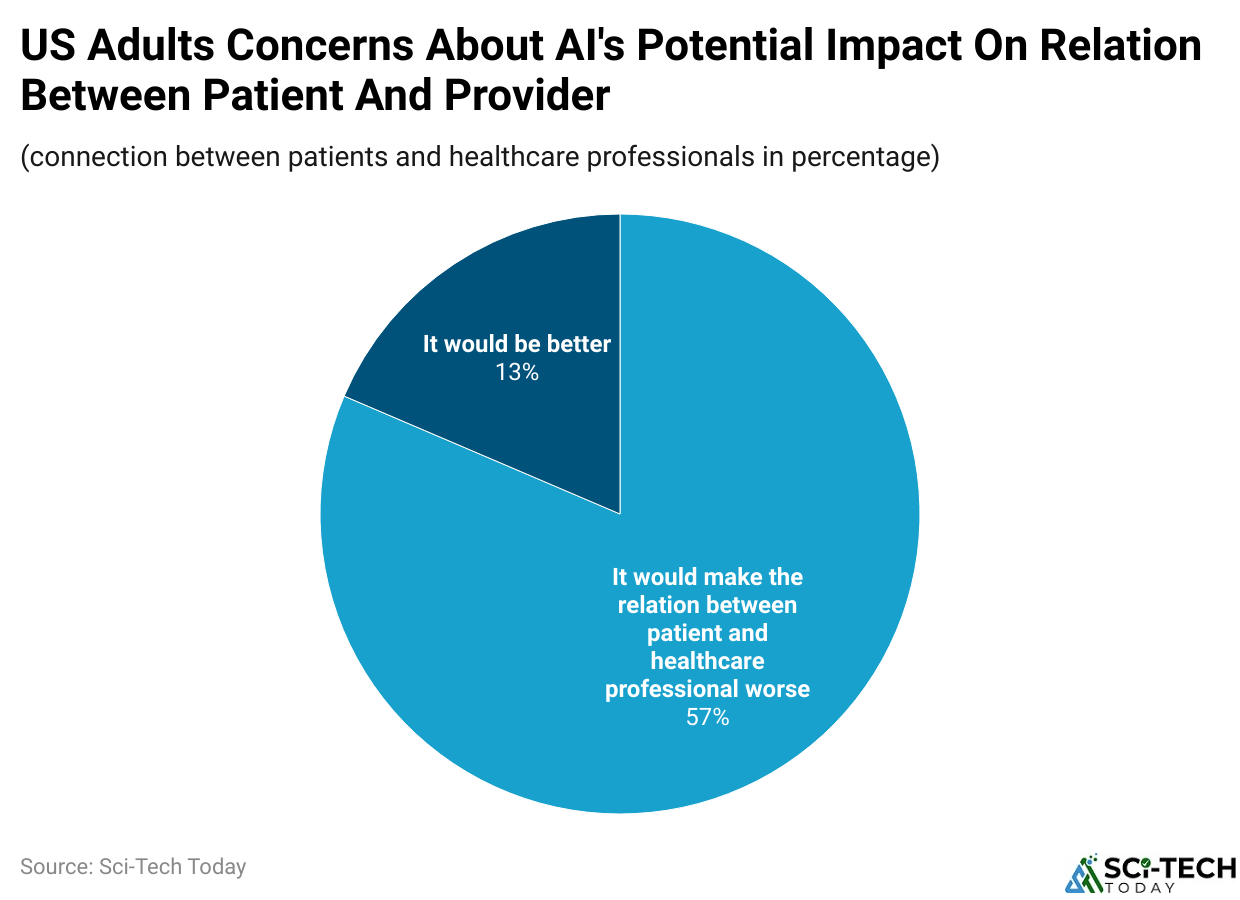
(Reference: scoop.market.us)
- In the US, 57% of adults believe using AI in diagnosis and treatment would harm doctor-patient relationships, while only 13% think it would improve them.
AI In Healthcare Statistics By Key Areas
- AI can handle large datasets, helping in diagnostics, especially medical imaging; thus, around 60% of hospitals may use AI to diagnose cancer, heart diseases, and more, reaching USD 2.9 billion in 2024.
- Around 45% of healthcare organizations will use AI-powered predictive analytics to improve patient care and cut costs, saving an estimated USD 15.7 billion worldwide.
- As mentioned in AI in Healthcare Statistics, in the same year, AI in the robotic surgery market will grow to USD 12.7 billion, largely due to the increasing number of minimally invasive surgeries.
- AI is helping drug discovery move faster and cheaper, saving pharmaceutical companies up to USD 28 billion a year by 2024 through improving research and development.
- Meanwhile, around 40% of healthcare consultations are estimated to be conducted through telemedicine, with AI playing a central role in triaging and initial patient assessment.
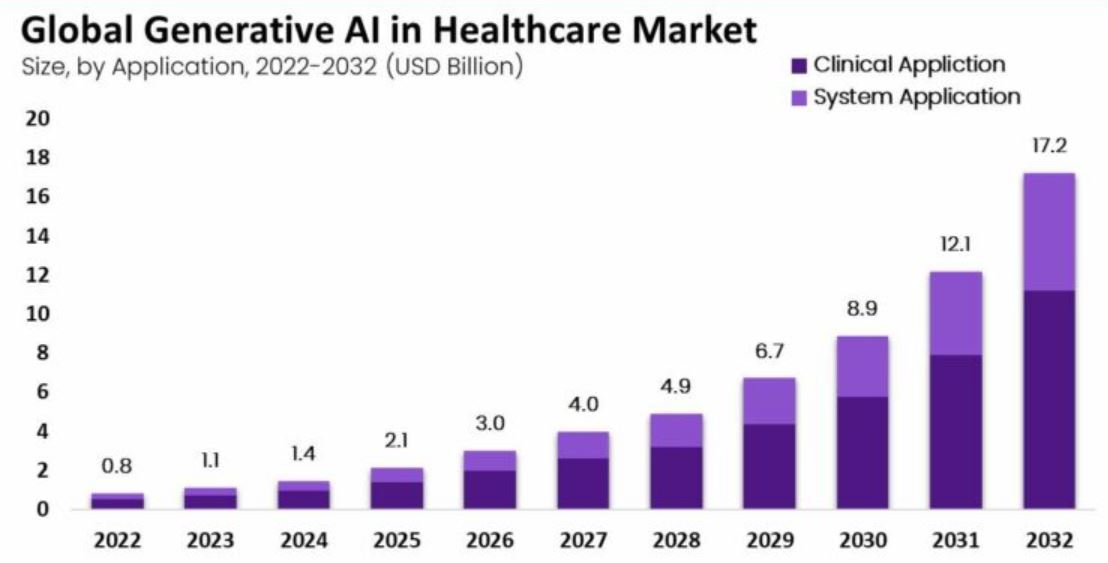
(Source: market.us)
- The global market valuation of AI in the healthcare market (both in clinical and system applications) is estimated to reach around USD 1.4 billion by the end of 2024, increasing from USD 1.1 billion in 2023.
- The market size is supposed to reach USD 17.2 billion by 2032, with a CAGR of 37% from 2023 to 2032.
- Furthermore, in coming years, the market size of this sector will increase, as predicted above in the graph, in 2025 (USD 2.1 billion), 2026 (USD 3.0 billion), 2027 (USD 4.0 billion), 2028 (USD 4.9 billion), 2029 (USD 6.7 billion), 2030 (USD 8.9 billion), and 2031 (USD 12.1 billion).
AI In Healthcare Market Segmentation Statistics By Technology
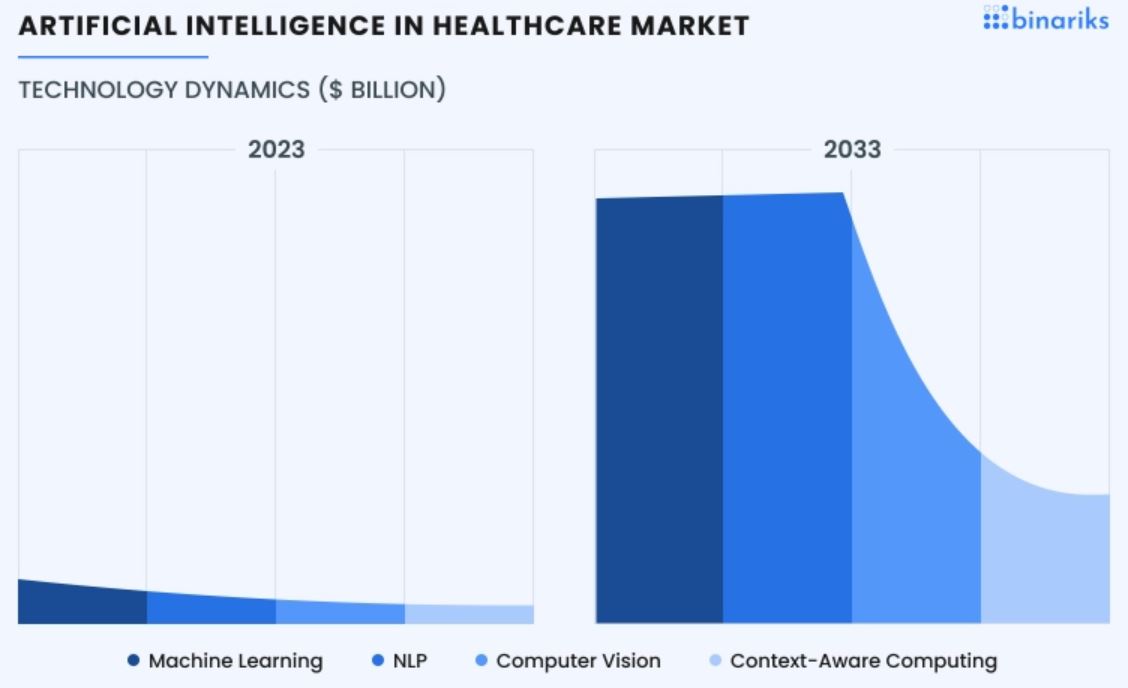
(Source: admin.binariks.com)
- Machine learning is widely used in healthcare and will be worth around USD 24.7 billion by 2024, making up 35% of the AI healthcare market.
- Meanwhile, the AI-based medical imaging market using machine learning is expected to grow by 26.5% between 2021 and 2028.
- AI in Healthcare Statistics also details that Natural Language Processing (NLP) experienced substantial growth in 2024, contributing around 18% to AI in the healthcare market.
- Robotic Process Automation (RPA): AI-powered robotic surgery witnessed rapid growth in 2024, contributing approximately USD 6 billion to the market.
AI In Healthcare Statistics By User Demographics
- In 2023, almost 60% of Americans claimed that they felt more comfortable, and 39% remained unforgettable when their healthcare providers used Artificial Intelligence.
- According to reports, 38% of US adults said AI in healthcare has improved patient outcomes. Of these, 45% are men, and 30% are women.
American Patient Satisfaction shared with AI in healthcare Experience Statistics:
| Felt comfortable with AI healthcare | Felt uncomfortable | |
| Age (years) | ||
| 18-29 | 44% | 29% |
| 30-49 | 39% | 32% |
| 65+ | 34% | 33% |
| 50-64 | 33% | 39% |
| Gender | ||
| Women | 30% | 38% |
| Men | 45% | 28% |
| Race / Ethnicity | ||
| Hispanic | 40% | 30% |
| White | 37% | 35% |
| Black | 35% | 30% |
| Education | ||
| Postgrad | 50% | 26% |
| College grad | 42% | 32% |
| Some college | 35% | 35% |
| HS or less | 31% | 35% |
By Patients
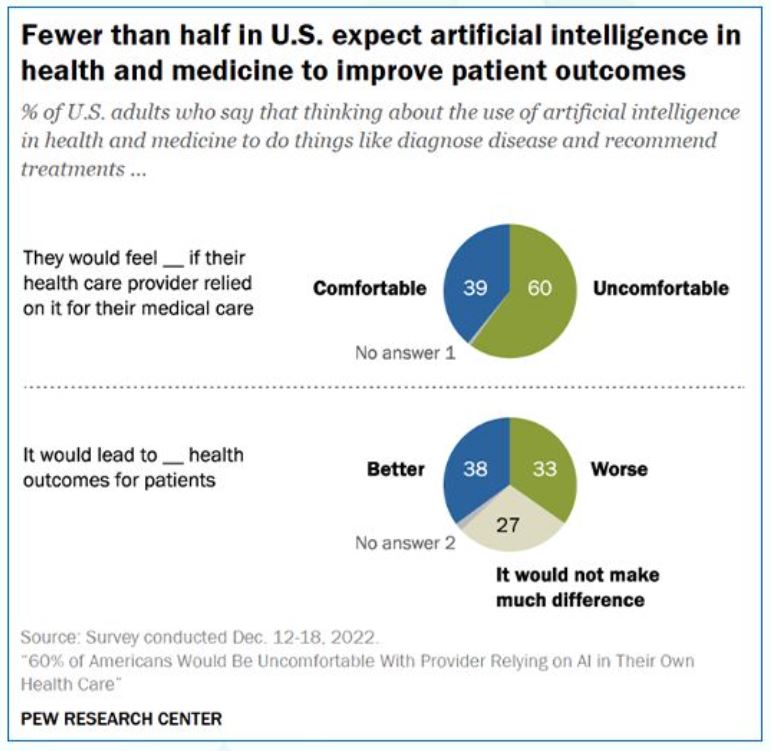
(Source: d2ms8rpfqc4h24.cloudfront.net)
- Around 60% of Americans feel uncomfortable about their healthcare provider using AI technologies, while 39% feel comfortable.
- Similarly, 38% of people believe AI will improve health outcomes, 33% disagree, and 27% have no opinion.
- As mentioned in AI in Healthcare Statistics, around 75% of US people have started using AI before understanding the terms and usage.
- Meanwhile, around 23% of adults are slowly using technology, needing more opportunities to improve their health.
The table below further states that other AI usage in the healthcare segment by US people shares is stated below:
| People move too fast using this technology before fully understanding the risk to patients | US adults are those who move too slowly | Among those who have heard about AI. |
| 70% | 29% | A lot |
| 77% | 22% | A little |
| 75% | 21% | Nothing |
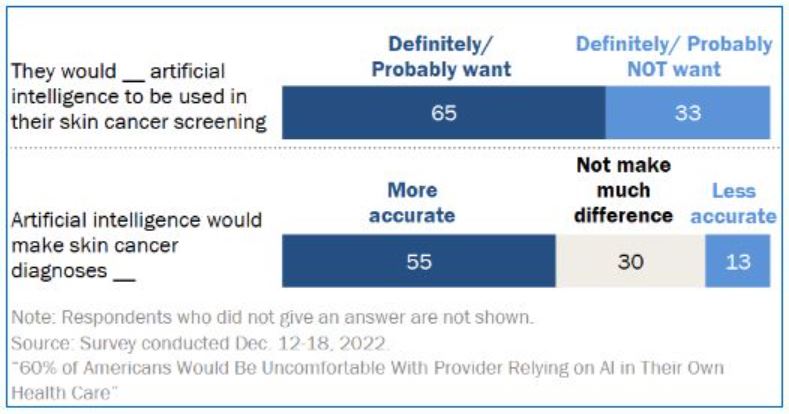
(Source: d2ms8rpfqc4h24.cloudfront.net)
- As per AI in Healthcare Statistics, about 65% of US adults say they would like AI to be used for skin cancer screening, and 33% do not want to undergo the process.
- Meanwhile, almost 55% of people believe AI could be better than traditional methods for screening skin cancer, followed by 30% (not much difference) and 13% (less accurate).
By Country And Region
- According to AI in Healthcare Statistics, the US will lead the global AI healthcare market in 2024, which is projected to reach USD 24.7 billion.
- In the same year, US healthcare AI startups will raise more than USD 4 billion from investors.
- Europe’s AI healthcare market is expected to be worth USD 18.4 billion by 2024, with a growth rate of 39.2% per year.
- In the UK, around 40% of hospitals use AI for diagnostics, followed by Germany (35% for medical imaging and surgery) and France (28% focusing on personalized medicine in healthcare).
- The AI healthcare market in Asia-Pacific will reach USD 15.2 billion, driven by the increasing use of AI in hospitals, diagnostics, and patient care across the region.
- In 2024, China’s AIAI healthcare market will reach USD 9.5 billion, Japan will use AIAI in 45% of nursing homes, and India’s AIAI healthcare sector will save USD 3 billion in costs.
- However, the market size of Latin America’s AI in Healthcare will reach around USD 2.7 billion by the end of 2024.
- In Brazil, AI helps public hospitals with diagnostics and better patient outcomes, growing by 38% yearly, while in Mexico, nearly 35% of healthcare providers use AI to improve telemedicine services.
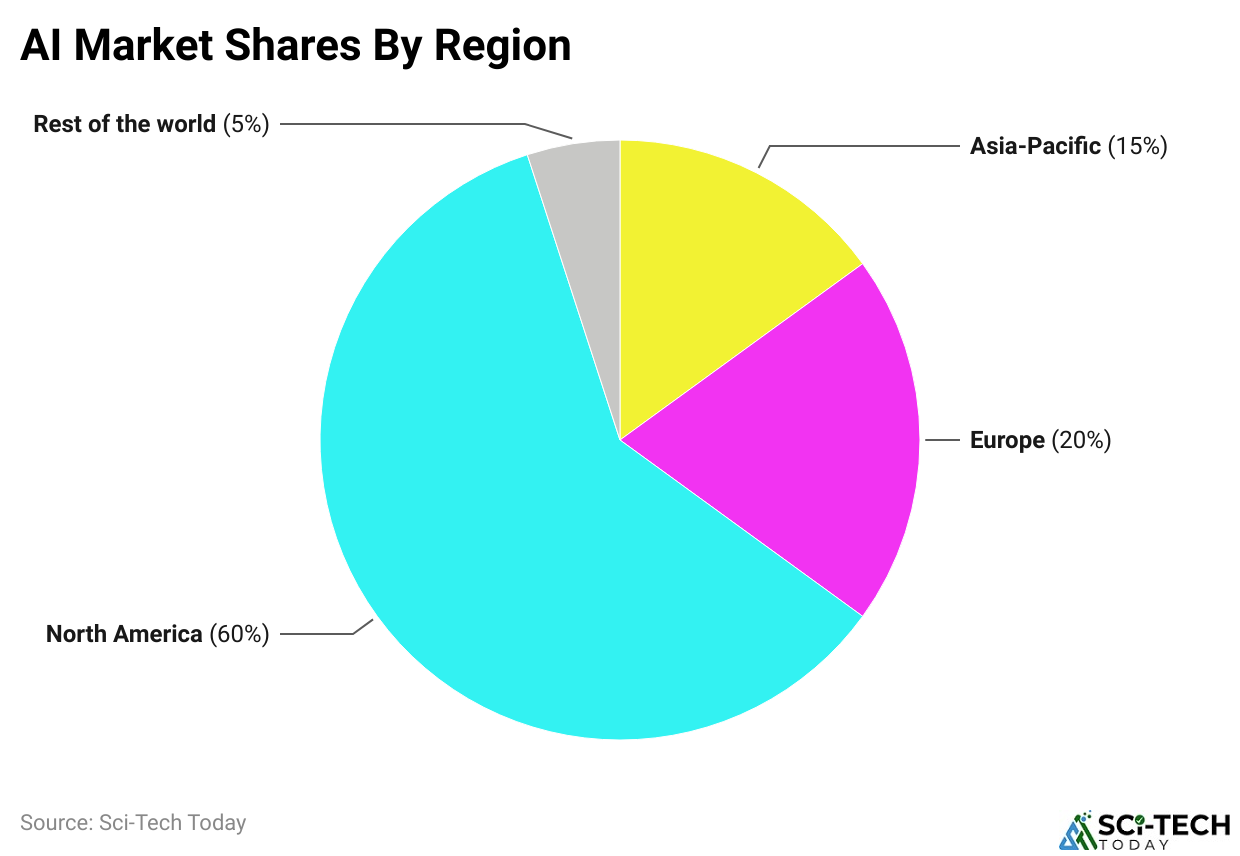
(Reference: allaboutai.com)
- As of May 2024, the North American region earned the highest revenue, accounting for over 60% of the total share.
- Europe holds 20% of the market, marking a notable presence, though significantly smaller compared to North America’s dominance.
- In addition, other regions’ revenue share is followed by Asia Pacific (15%) and the rest of the world (5%).
By Components
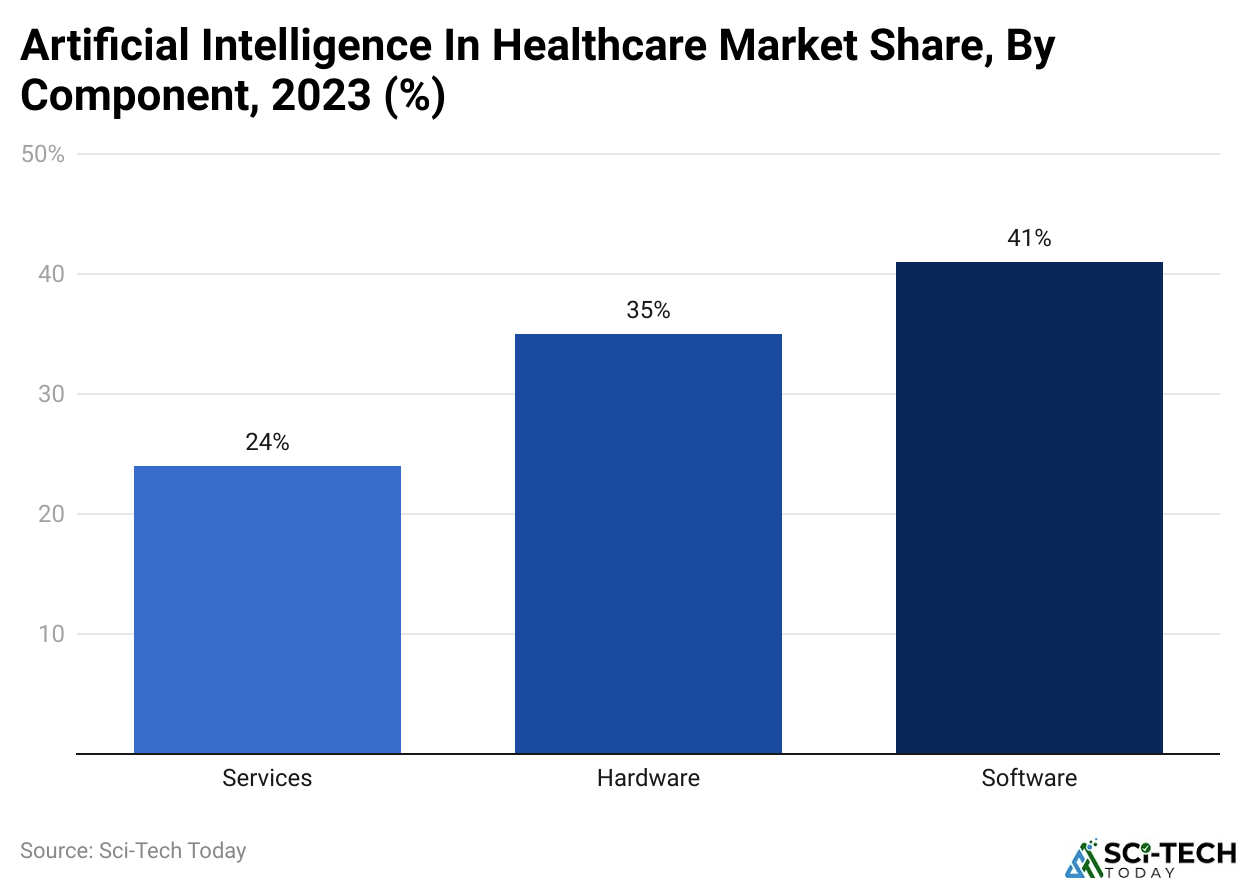
(Reference: precedenceresearch.com)
- AI in Healthcare Statistics also reports that, depending on components, the software segment recorded the highest revenue share in the AI healthcare market, accounting for 41% in 2023.
- On the other hand, other component shares of the market at the same time were Hardware (35%) and Services (24%).
US Artificial Intelligence (AI) In Healthcare Market
(Reference: precedenceresearch.com)
- The US AI healthcare market size was USD 6.07 billion in 2023 and will reach approximately USD 8.41 billion by 2024.
- The market’s growth rate will reach 37% from 2024 to 2034, approaching USD 195.01 billion, which shows a significant growth in AI’s role in healthcare.
Top Companies In AI In The Healthcare Market, 2024
| Company Names | Revenue (USD) | Focus Areas | Key Products |
| IBM Watson Health | 5.8 billion | Disease diagnosis, drug discovery, and personalised medicine. | AI tools are used in oncology and clinical decision support systems, with over 50% of top US hospitals utilising their AI solutions. |
| Microsoft Healthcare AI | 4.5 billion | Hospitals are helping with patient management, hospital operations, and predictive health analytics. | Over 40% of hospitals globally use Microsoft Azure for Healthcare, which helps to streamline patient data management and improve diagnostics. |
| Google Health (Alphabet) | 3.6 billion | Medical imaging, diagnostics, and predictive analytics. | AI algorithms from Google Health have improved the accuracy of detecting breast cancer by 99% and are being used in healthcare systems worldwide. |
| Siemens Healthineers | 3.1 billion | diagnostics, robotic surgery, and hospital management systems. | Siemens’ AI-driven diagnostic tools are used by 50% of healthcare providers in Europe, helping to reduce diagnosis times by 35%. |
| NVIDIA | 2.9 billion | Medical research, drug discovery, and imaging. | NVIDIA’s AI-powered systems are used for cancer research, and 70% of the world’s top research institutions use their AI technology for drug discovery. |
| Philips Healthcare | 2.4 billion | Diagnostics, imaging solutions, and patient monitoring systems. | Their AI-powered imaging tools are used in 40% of hospitals in Europe to diagnose cancer and cardiovascular diseases with precision. |
| GE Healthcare | 2.2 billion | Imaging, diagnostics, and patient management. | AI imaging systems are used in 30% of hospitals worldwide for faster and more accurate diagnostics. |
| Intel Corporation | 1.7 billion | Medical devices and wearables. | Intel AI is integrated into 30% of wearable healthcare devices, enabling continuous health monitoring for patients. |
AI-Enabled Devices Across Medical Disciplines
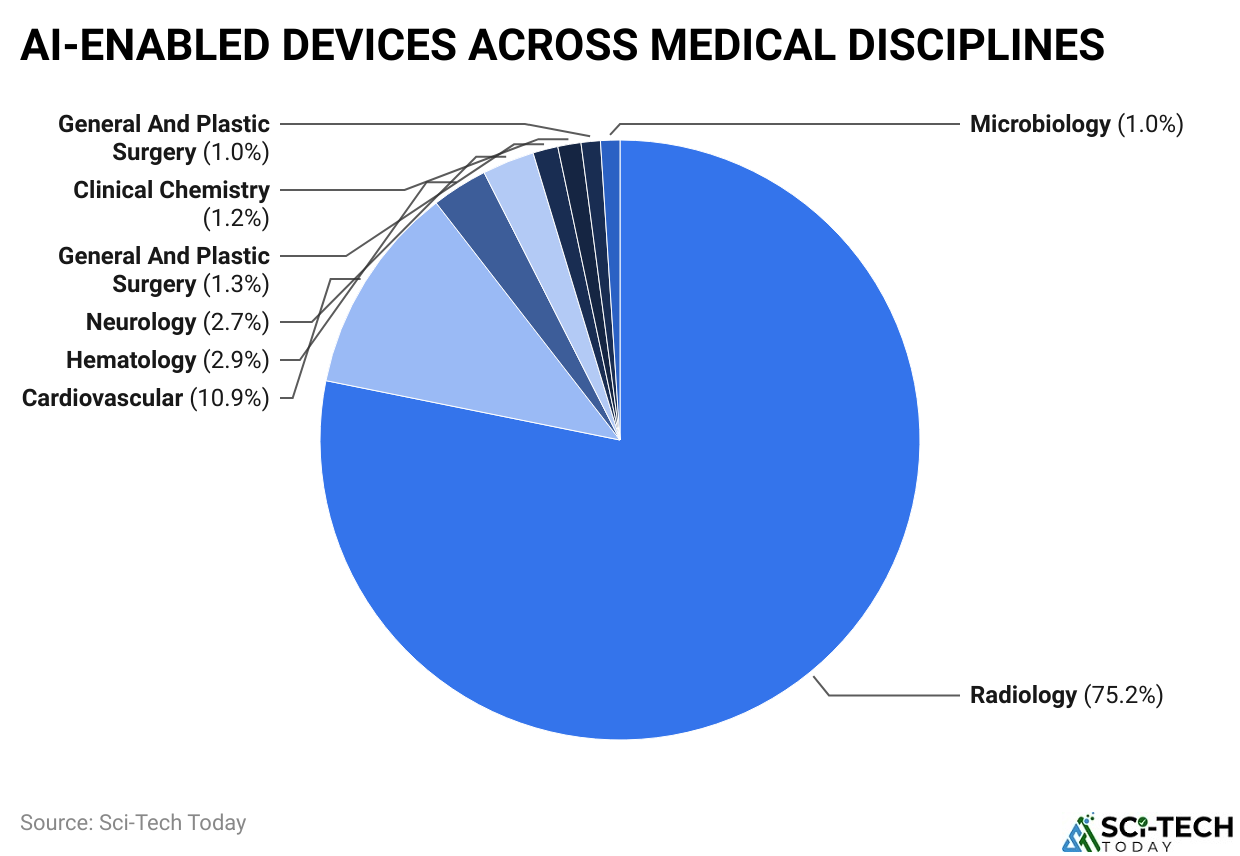
(Reference: admin.binariks.com)
- AI in Healthcare Statistics further reports that Radiology will have 75.2% of the usage share of AI devices, or 391 FDA-cleared devices, by the end of 2023, showing that radiological imaging is very promising and widely used in medical practice.
- In contrast, Cardiovascular (10.9%), Haematology (2.9%), and Neurology (2.7%) captured the next three top positions.
- Furthermore, other AI-enabled devices used across global medical sectors were General and Plastic Surgery (1.3%), Clinical Chemistry (1.2%), and Microbiology (1.0%).
Professionals’ Views On Using AI In Healthcare Adoption
- AI in Healthcare Statistics shows that nearly 59% of professionals think AI will provide services that save money and are more efficient in 2024.
- Meanwhile, 55% of professionals said that using AI in healthcare is helping improve patient outcomes.
- During COVID-19, healthcare services adopted advanced AI, as stated by 56% of professionals.
- In contrast, AI algorithms helped 51% of professionals to reach their goals more quickly.
- Over 37% of professionals want to use AI tools to assign accurate codes for diagnoses, procedures, and facilities by 2024.
Artificial Intelligence In The Drug Discovery Market
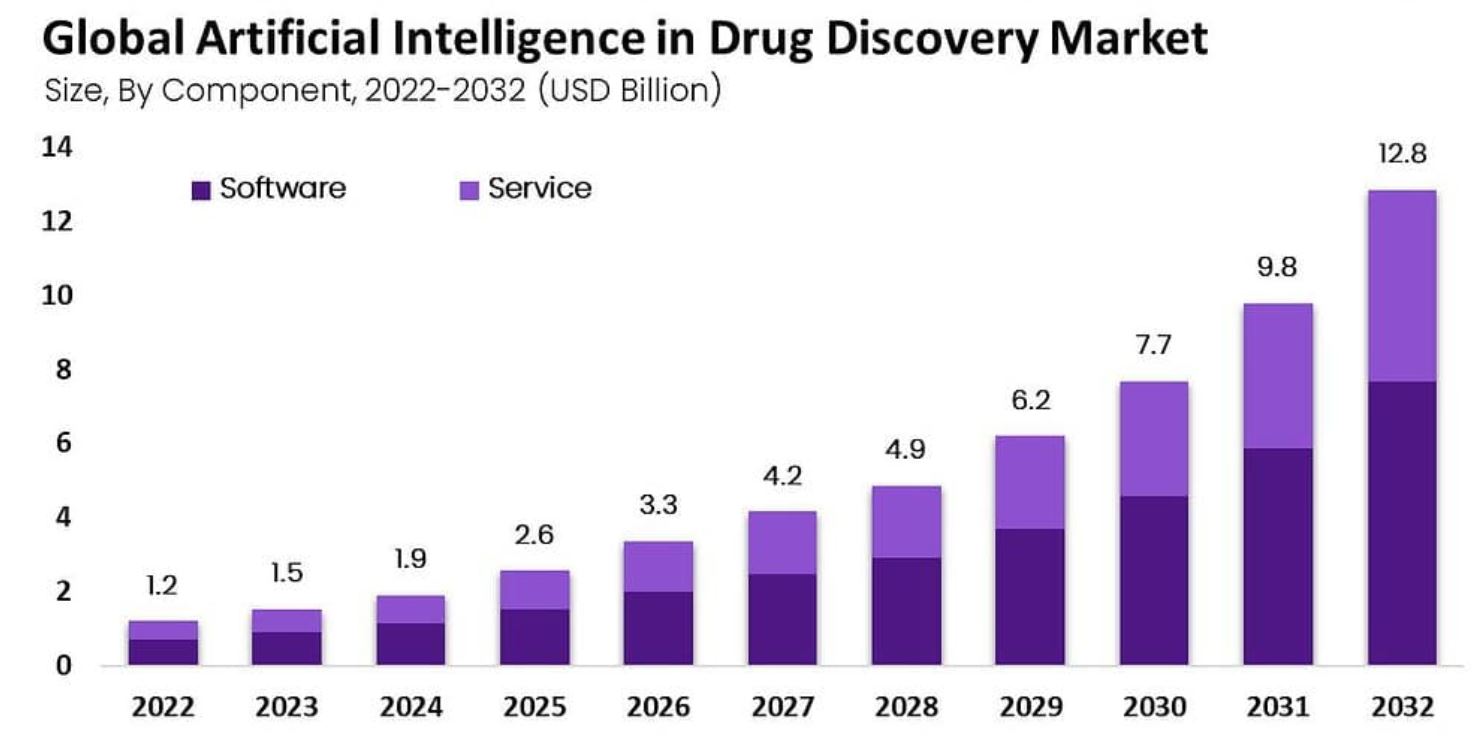
(Source: market.us)
- A report published by Market.us elaborated that the global AI in drug discovery market will be worth USD 1.9 billion by 2024.
- It is supposed to grow at 27.5% annually and reach USD 12.8 billion by 2032.
- The North American region secured the highest revenue in the AI drug discovery market, with USD 0.68 billion.
- AI in Healthcare Statistics also reports that over 40% of experts use AI to analyze medical images, such as CT scans and X-rays, to detect diseases early.
- Deep learning can do the same tasks as human experts, with 86.4% sensitivity and 90.5% accuracy.
- Meanwhile, a recent study found that machine learning performs like human experts, with 87% sensitivity and 92% accuracy.
Global AI In Healthcare Market Value Statistics, By Application
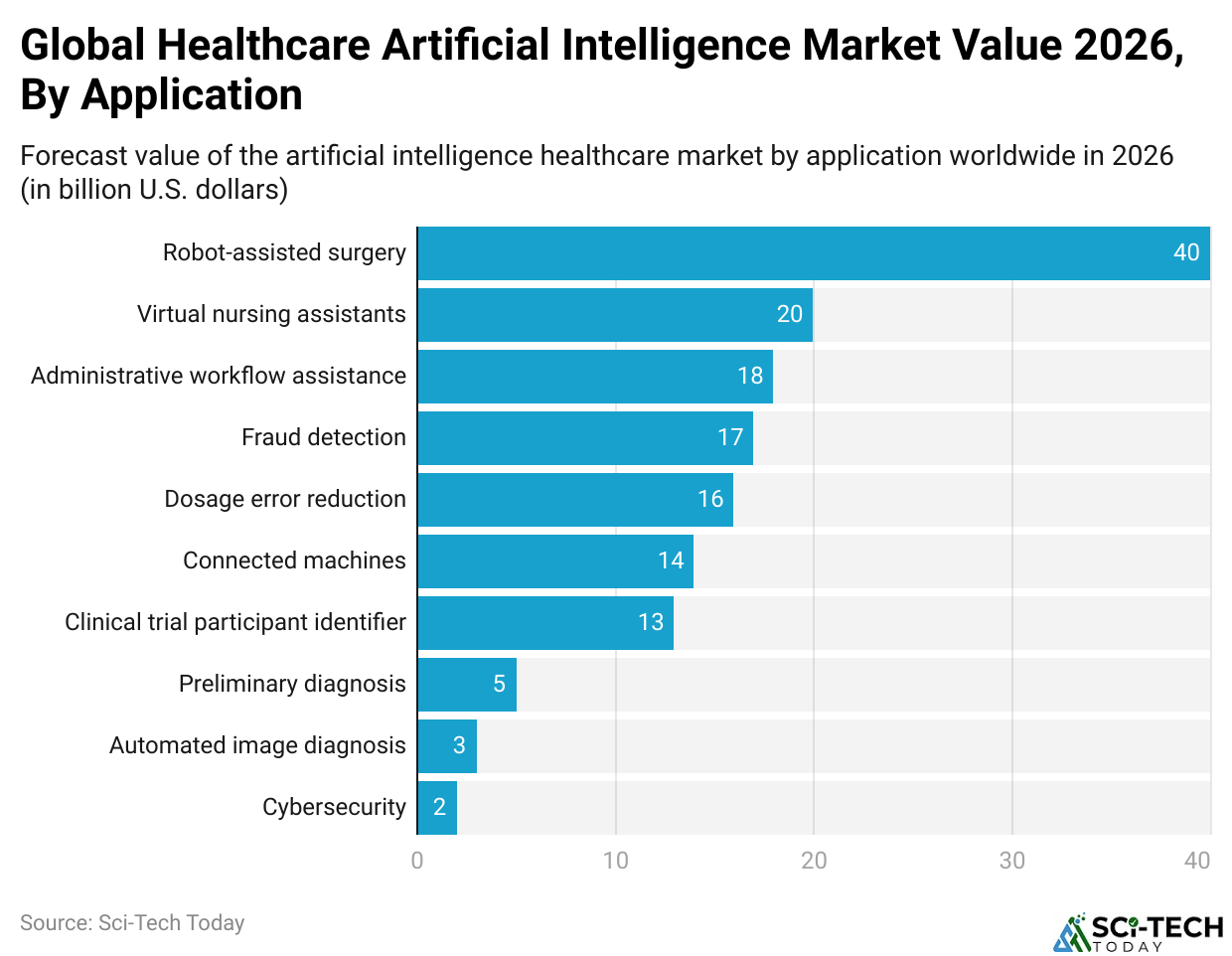
(Reference: scoop.market.us)
- The AI-assisted robotic surgery market will grow the fastest and reach USD 40 billion by 2026, while virtual nursing assistants will generate USD 20 billion by the same year.
- Furthermore, the estimated market valuation of other applications is represented as administrative workflow assistance (USD 18 billion), Fraud detection (USD 17 billion), Dosage error detection (USD 16 billion), Connected machines (USD 14 billion), Clinical trial participant identifier (USD 13 billion), Preliminary diagnosis (USD 5 billion), Automated image diagnosis (USD 3 billion), and Cybersecurity (USD 2 billion).
Healthcare Chatbots Market Statistics By Component
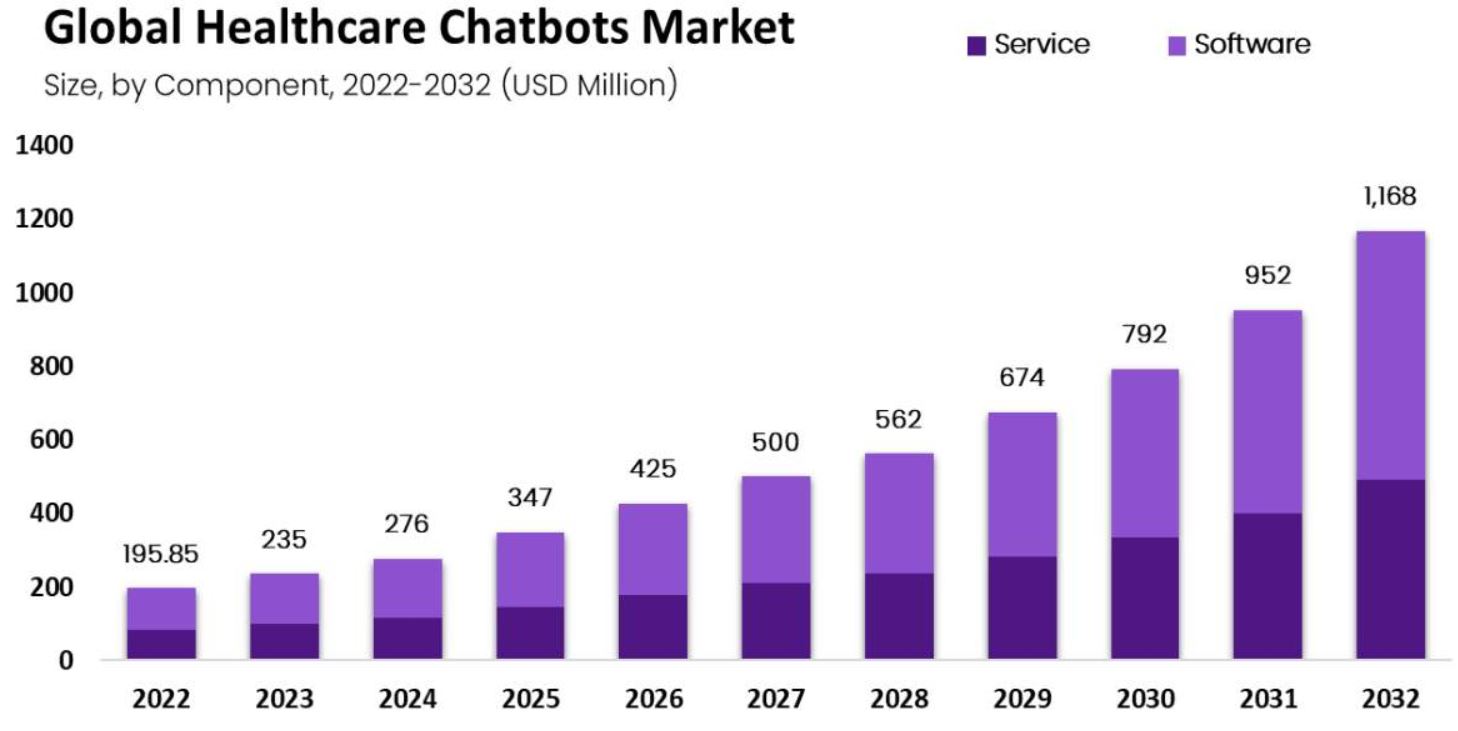
(Source: market.us)
- The global market valuation of the global healthcare chatbots market size (both in service and software components) will reach around USD 276 million by the end of 2024, up from USD 235 million in 2023.
- The market is supposed to grow at a CAGR of 20.1% from 2023 to 2032, resulting in USD 1,168 million.
Cost-Efficiency In Healthcare Statistics By AI In Healthcare For 2024
- AI and machine learning will reduce healthcare costs by USD 13 billion by 2025 through improved efficiency and fewer errors.
- On the other hand, AI-driven chatbots are projected to save USD 3.6 billion globally, improving efficiency in various industries.
- AI can cut drug discovery costs by up to 70%, significantly transforming the pharmaceutical industry.
- As per AI in Healthcare Statistics, reducing medication dosing errors could save up to USD 16 billion in healthcare costs.
- AI implementation in healthcare has reduced physicians ‘ administrative work by around 20%, easing their workload significantly.
- Predictive AI tools are a significant advancement in healthcare, potentially cutting hospital admissions by as much as 50%.
New AI Product Launches In Healthcare Statistics 2024
AI Diagnostics Tools
- A leading AI platform, AI Dx Pro, launched in Q1 2024, offers enhanced accuracy for detecting breast cancer and lung diseases with an accuracy rate of 94%.
- Another product, Neuro AI, specializes in detecting early-stage Alzheimer’s disease and is expected to streamline patient diagnostics and save healthcare providers up to USD 1.2 billion annually.
- The AI diagnostics market will grow to USD 6.7 billion by the end of 2024, with an annual growth rate of 36%.
AI-Powered Surgical Robots
- AI in Healthcare Statistics shows that the SurgiAI robotic platform, launched in early 2024, is equipped with machine-learning algorithms that allow it to adapt to various surgical procedures. It is projected to reduce post-surgical complications by 20%.
- RoboDoc is another AI-powered surgical assistant that can perform complex surgeries autonomously under human supervision. It is being adopted by 25% of major hospitals in the US.
- The AI-driven robotic surgery market is estimated to reach USD 12.5 billion by 24, with more than 40% of surgeries in developed countries using robotic assistance.
AI in Telemedicine
- Care Assist AI, introduced in Q2 2024, uses natural language processing (NLP) to communicate with patients. It helps diagnose conditions based on symptoms and medical history.
- It can also handle 70% of non-emergency cases, reducing the burden on healthcare professionals.
- TeleMed AI focuses on providing AI-assisted remote diagnostics in rural areas and will cover 15 million users by the end of 2024.
- AI telemedicine will generate $8.2 billion in revenue by the end of 2024, with a 38% growth rate.
AI In Drug Discovery And Development
- As mentioned in AI in Healthcare Statistics, Pharma AI was launched this year and is an AI-powered platform that has reduced drug discovery time by 50% and costs by 35%. This platform is currently being used by over 200 pharmaceutical companies worldwide.
- BioSense AI is another platform launched in 2024, which focuses on AI-driven precision medicine and will contribute to the $28 billion savings in R&D costs globally by year-end.
- The AI drug discovery market is set to reach $6.8 billion in 2024, with a 40% annual growth rate.
AI for Patient Management and Hospital Operations
- HospitalIQ AI, launched in 2024, helps manage patient admissions and hospital resources efficiently, reducing operational costs by 15%.
- Introduced in early 2024, SmartBed AI uses machine learning to monitor patient conditions in real time, reducing hospital stays by 25%.
AI Market And Technology Adoption Statistics In Healthcare For 2024
- As mentioned in AI in Healthcare Statistics, 20% of healthcare organizations currently use AI to improve operations and enhance patient care efficiency.
- As of 2024, in the NHS, 34% of AI tools are used primarily for diagnostics.
- By 2025, around 90% of the healthcare sector is going to employ Artificial Intelligence.
- To date, approximately 10% of medical professionals use AI tools.
- In America, only 23% of healthcare executives have proper knowledge about AI’s efficiency.
- Despite AI advancements in healthcare, humans are still expected to perform 90% of nursing tasks by 2030.
Challenges And Barriers To Implementing AI Healthcare Features
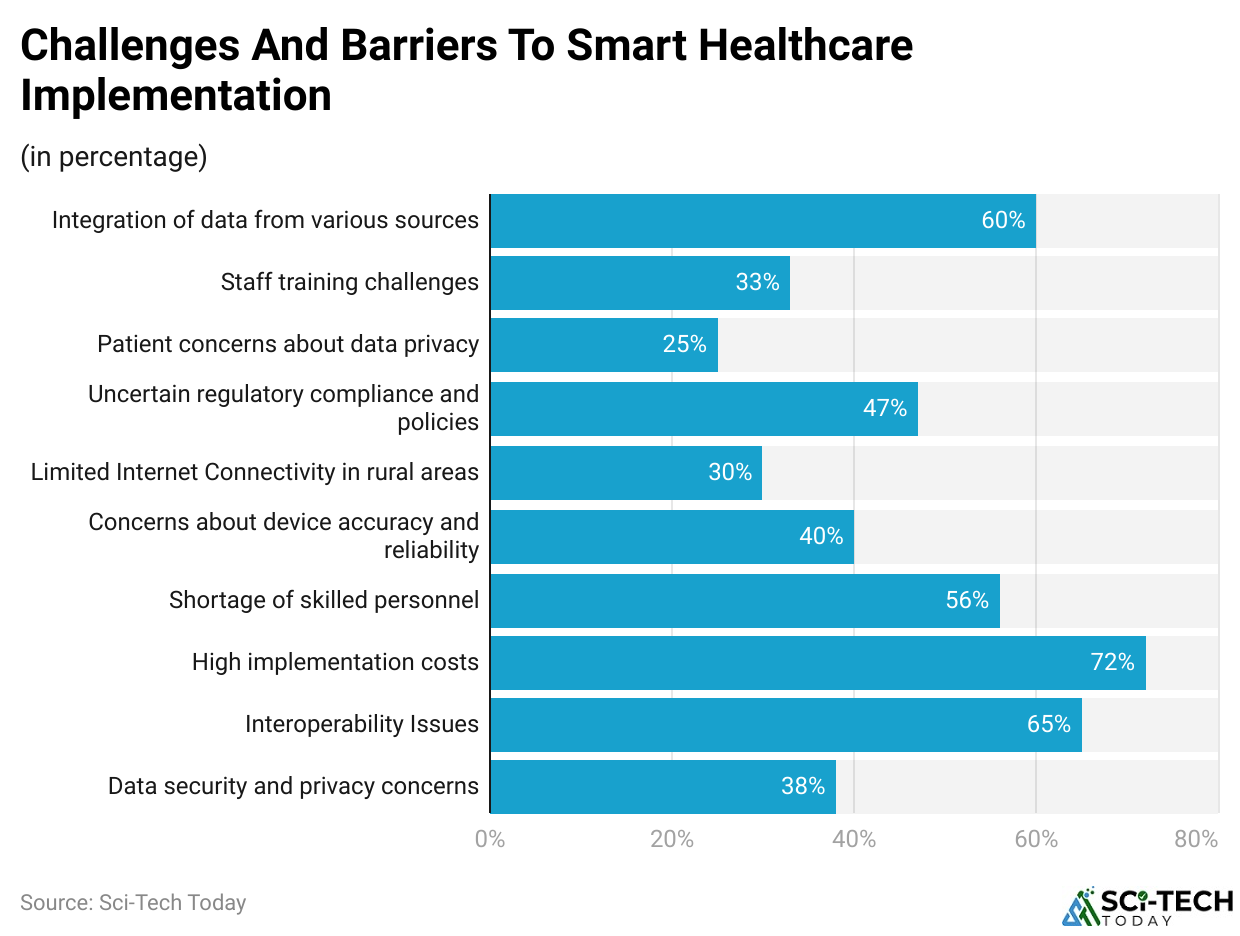
(Reference: scoop.market.us)
- The above graph analysis shows that 72% of healthcare workers struggle with the high costs of smart healthcare technology that are challenging to manage.
- Meanwhile, 65% of healthcare providers need help integrating smart healthcare technologies with their current systems due to interoperability issues.
- Around 60% of healthcare providers need help to combine data from different sources.
- 56% of healthcare organizations need help finding skilled people to manage advanced healthcare systems due to staff shortages.
- AI in Healthcare Statistics further elaborates on other challenges, including concerns about device accuracy and reliability (40%), data security and privacy concerns (38%), staff training difficulties (33%), limited internet connectivity in rural areas (30%), and patient concerns about data privacy (25%).
Conclusion
AI in healthcare is growing rapidly and changing how healthcare is delivered. Technologies like machine learning, natural language processing, and robotic-assisted surgery are helping doctors diagnose diseases faster and more accurately. The market will keep expanding, with North America leading and Europe and Asia-Pacific following close behind. With continued advancements, AI will become even more important in the healthcare industry in the coming years.
This article on AI in Healthcare Statistics covers all the current statistics about the global healthcare market, so please go through it and share your reviews.
FAQ.
AI technologies like machine learning, NLP, and robotics enhance healthcare by improving diagnostics, treatment planning, and patient management, thus boosting efficiency in medical care.
Machine learning, commonly used in diagnostic imaging and drug discovery, and natural language processing, applied in clinical documentation and coding, are among the most prominent AI technologies in healthcare.
The main applications are medical imaging, robot-assisted surgery, drug discovery, precision medicine, and virtual assistants.
AI will personalise healthcare, enhance disease diagnosis, shorten treatment durations, and streamline healthcare management systems.

Maitrayee, after completing her graduation in Electrical Engineering, transitioned into the world of writing following a series of technical roles. She specializes in technology and Artificial Intelligence, bringing her experience as an Academic Research Analyst and Freelance Writer, with a focus on education and healthcare under the Australian system. From an early age, writing and painting have been her passions, leading her to pursue a full-time career in writing. In addition to her professional endeavors, Maitrayee also manages a YouTube channel dedicated to cooking.

